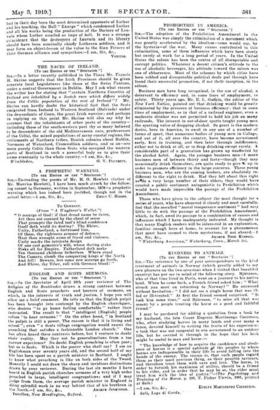KINDNESS TO ANIMALS.
[To THE EDITOR Or THE " SPECTATOR.") Sin,—The reference by one of your correspondents to the kind treatment of animals in Norway (which greatly added to my own pleasure on the two occasions when I visited that beautiful country) has put me in mind of the following story. Bjornson, who at that time lived in Paris, went on a journey to his native land. When he came back, a French friend asked him : " What struck you most on returning to Norway?" He answered without hesitation "I did not see a single horse that was ill- fed or ill-treated." At first the friend seemed surprised. " It took him some time," said Bjornson, " to seize all that Fa, meant by a people treating the horse as a good and faithful friend."
I may be pardoned for adding a quotation from a book by my husband, the late Count Eugenio Martinengo Cesaresco, who, after studying horses in many lands and over many a fence, devoted himself to writing the fruits of his experience: a task that was not congenial to one accustomed to an outdoor life, but Ile carried it through in the hope that his book might be useful to man and horse— "The knowledge of hove to acquire the confidence and obedi- ence of horses is a special aptitude 2f the peoples to whom horses are indispensable in their life le avoid falling into the hands of the enemy. The reason is, that such people regard them as their most precious thing, as their possible saviours; and therefore treat them with care and love. The horse, in order to furnish his maximum of utility, should be a friend to his rider, and in order that he may be so, the rider must treat him with the idea of justice."—(The Psychology and Training of the Horse, p. 193, T. Fisher Unwin, 1901, printed at SOO.)
Salk Logo di Garda. '


































 Previous page
Previous page